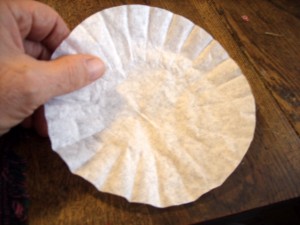Remembering to Change The Filters In Our Heads
All of us have filters.
Yeah, the flimsy paper kind you slip into the coffee-maker; the kind you hope you remember to throw away before it starts to grow tiny mold islands. (Read between the lines for unintended confession, ay?)
But there’s also the filters in our heads–the set of criteria we use to sift through our daily experiences.
Example: Person A walks into the staff lounge, waves hello and then makes a beeline for the coffee pot, which is near empty. Without saying a word, Person A pours himself a cup, rinses out the coffee pot, refills the grounds and brews a new pot.
Person B and Person C are sitting on the folding chairs around the break table, watching Person A.
Person B filters the situation like this: Its nice of Person A to take the time to clean out the coffee pot and brew a new pot for the next person, even though I’m sure he just stopped in quickly between work responsibilities.
Person C filters the same situation like this: Wow. What’s up with Person A? They barely even acknowledged us sitting here. No small talk. Nothing. Why are they acting cold toward me?
Filters.
We all have them.
But a huge chunk of awareness is…
realizing which ones we’re using.
Here’s a few common filters:
- The Victim Filter: You look for ways you are short changed or treated unfairly, falsely believing that you yourself always treat
 people in ways they would deem fair. (Gulp. I have to admit, I use this filter sometimes.)
people in ways they would deem fair. (Gulp. I have to admit, I use this filter sometimes.) - The Perfection Filter: You filter for people’s weaknesses or insecurities. You notice ragged fingernails, chipped teeth, mismatched socks, verbal screw-ups, bad habits, the time they forgot to call…and after you notice them, you’re likely to repeat them to others.
- The Abandonment Filter: Many of your family and friend-relationships end in you feeling like the other person walked out of your life, without reflecting on how your own expectations and behaviors send unwelcoming messages, making it difficult for people to gauge your own commitment or to maintain the good feeling between you.
- The Comparison Filter: You constantly compare yourself to other people – to how they look, to their accomplishments, to their groups of friends and social schedules. You track how people treat you compared to how they treat others and develop grudges from this.You think that all people compare like you do, so you expend unnecessary energy worrying about how you divide your time or what you seem to be accomplishing, because you want to be assessed well in other people’s estimation.
- The Ideal Filter: You have a specific idea for how you expect events to unfold, how you expect friendships to progress, how you expect your career life to work out and you can’t or aren’t willing to adapt when real life doesn’t fall neatly into those ideals. You fail to take into account that other people’s ideals may be entirely different than yours and that the two versions may not be compatible. (Oh man. Guilty as charged.)
The sucky part, of course, is that the coffee-maker metaphor carries over. If we keep using the same, worn-out filters, mold starts to cloud over the way we see the world. We can’t see reality beyond the story lines we’ve created. And we filter out the good, or we fail to take responsibility for ourselves, because we’re too busy collecting evidence to reinforce the hypotheses (filters) we are trying to prove.
Even more of a bummer? Sometimes we collect skewed information and repeat it to others. We unfairly influence our spouse, friends or others by presenting them with all of the filtered data we collected and driving them to a conclusion that may be…well, partly right…but incomplete….because it’s filtered.
(*These are summaries of the lenses presented in the book, Bridges of Communication)
What about you? What filters do you use? Or notice others using? And how do you go about learning to see life a new way?


